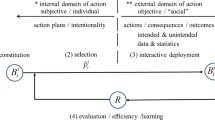Abstract
The representation of evolving economies can be formally represented through evolutionary self-organized systems (ESO), a cellular automata model with endogenous rules of change. Another possibility is to consider economic evolution as the result of the nested application of rules of changes on certain structures we call economic systems. Both approaches show disadvantages: ESO systems are too general and arbitrary, while the application of rules to rules lacks in most cases an effective characterization. In order to get the best out of both worlds we define here a notion of economic ESO systems. We show that the class of these systems is equivalent to a subclass of economic systems. The systems in this subclass can be effectively represented, with the extra bonus that the crucial role we assume knowledge plays in the mechanism of economic evolution becomes explicit. We claim that these systems are particularly fit for representing the notion of “poverty trap”. In fact, they arise in an economic system that is unable to surpass a critical boundary.
Access this chapter
Tax calculation will be finalised at checkout
Purchases are for personal use only
Similar content being viewed by others
Notes
- 1.
For instance, Arenas et al. (2000) present a specification of technological evolution based on the local interaction of a finite number of agents in a low dimensional space. This is the typical case of a SOC system.
- 2.
A “soft” computation approach is presented in Weiss and Kulikowski (1990).
References
Arenas, A., Díaz-Guilera, A., Llas, M., Perez Conrad, J., Vega-Redondo, F.: A Self-organized model of technological progress. In: CEF 2000 proceedings (2000)
Azariadis, C., Stachurski, J.: Poverty traps. In: Aghion, P., Durlauf, S. (eds.) Handbook of Economic Growth. Elsevier, Amsterdam (2005)
Boolos, G., Jeffrey, R.: Computability and Logic. Cambridge University Press, Cambridge (1974)
Kosko, B.: Fuzziness vs. probability. Int. J. Gen. Syst. 17, 211–240 (1990)
London, S.: Instituciones, Sistemas Complejos, y la Teoría Económica Evolucionista. In: Jardón Urrieta, J. (ed.) Evolucionismo Económico, Instituciones y Sistemas Complejos Adaptativos. Porrúa, México (2008)
Lucas, R.: Lectures on Economic Growth. Harvard University Press, Cambridge (2002)
Mandelbrot, B.: Fractional Brownian motions, fractional noises and applications. SIAM Revi. 10, 422–437 (2002)
North, D.: Institutions and Economic Theory. Am. Econ. 36, 3–6 (1993)
Tohmé, F., London, S.: A Mathematical Representation of Economic Evolution. Math. Comput. Model. 27(8), 29–40 (1998)
Author information
Authors and Affiliations
Corresponding author
Editor information
Editors and Affiliations
Rights and permissions
Copyright information
© 2015 Springer International Publishing Switzerland
About this paper
Cite this paper
London, S., Tohmé, F. (2015). A Theoretical Approach to Endogenous Development Traps in an Evolutionary Economic System. In: Gil-Aluja, J., Terceño-Gómez, A., Ferrer-Comalat, J., Merigó-Lindahl, J., Linares-Mustarós, S. (eds) Scientific Methods for the Treatment of Uncertainty in Social Sciences. Advances in Intelligent Systems and Computing, vol 377. Springer, Cham. https://doi.org/10.1007/978-3-319-19704-3_21
Download citation
DOI: https://doi.org/10.1007/978-3-319-19704-3_21
Published:
Publisher Name: Springer, Cham
Print ISBN: 978-3-319-19703-6
Online ISBN: 978-3-319-19704-3
eBook Packages: EngineeringEngineering (R0)




